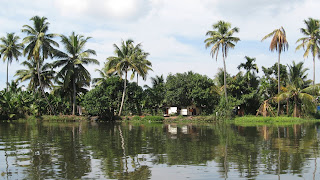Cochi in Kerala has a history of trade, supplying spices and latterly tea, rubber and coffee. The Chinese, Jews, Portuguese, Dutch and British have all left their imprint on the small town. It sits at the tip of a peninsula, guarding the entrance to a long lagoon. We arrive appropiately by boat, on a small ferry from the mainland, and it's a relief to find it a sleepy little place, with little traffic or noise, and easy to get around. Along the sea front are remnants of old Chinese fishing nets - large unwieldly things that cantilever out over the water - an indication of the early contact with Chinese traders. Around the fort area are scattered a number of well-restored Dutch merchants' houses, and along the dock side, in the shelter of the lagoon, the spice and tea warehouses stand shoulder to shoulder the whole length of the road. There are stagnant canals left over by the Dutch and scattered through the town are temples and churches. There is still a working synagogue here, built in the 1500's, but there are only 11 Jews left. Gayle saw a reference to it in the local paper - there is one young unmarried woman and one eligible batchelor, but the woman says she has no intention of marrying him. The synagogue is mentioned in Rushdie's The Moor's Last Sigh, so we visit to see the blue painted Chinese tiles across the floor which he describes.
Kerala, which means 'Land of Coconuts', has become a popular tourist  destination so we're not surprised to find quite a few holidaymakers knocking about. These are distinguished from other Indian travellers by their crisp bright white clothes, short skirts and strappy tops, and a separate wardrobe for dinner. But thanks to them, there is good fresh coffee available and cake - which makes a change from gobi masala and chappattis. We get a very decent room here too - thanks to all the competition - although the friendly fella on the desk never mentioned we would have to share it.
destination so we're not surprised to find quite a few holidaymakers knocking about. These are distinguished from other Indian travellers by their crisp bright white clothes, short skirts and strappy tops, and a separate wardrobe for dinner. But thanks to them, there is good fresh coffee available and cake - which makes a change from gobi masala and chappattis. We get a very decent room here too - thanks to all the competition - although the friendly fella on the desk never mentioned we would have to share it.
One of the must-do things in Kerala is to rent a houseboat - a large floating rattan affair and cruise the backwaters. Miles of waterways criss-cross the land, linking to the sea and cutting across swathes of farmland. So we opt for the cheap and cheerful ferry from Alleppey to Kottayam - a lovely day return ride that covers the same territory but costs an nth of the price, with a luxurious thali for lunch thrown in. Often we seem to be floating higher than the acres of surrounding paddy fields - many of the channels have built-up dykes on which are perched famers' houses. Coconut palms line every bank. It's a lovely lazy comfortable ride. Nearly everyone we pass by is doing their laundry in the water. There is the usual soaking, rub down with a block of soap and then the vicious thrashing against a flat stone. It looks like an endless process, but judging by the sparkling white lunghis and bright washing lines, it does the trick. Later on we pass several houseboats with Indian couples having a romantic holiday, along with the boat's captain, cook, cook's assistant and houseboy. We wonder what they do about the mosquitoes - it's extremely humid and the towns are infested. One evening we are sitting in a restaurant slapping our legs and scratching all over when the waiter comes round with a small brazier of smoking coals - very atmospheric, but it only kept the buggers at bay for about ten minutes.
Our final stop before we reach Trivandrum to fly to Sri Lanka, is at a small beach resort called Varkala. The lovely sandy beach has been saved by protecting cliffs, which has kept development off it. The cliffs though have a strip of hotels, shops and restaurants that all look the same after a while. But it's not too big a place, and there is talk that the attacks in Bombay have put off some of the usual seasonal holidaymakers. This is a relief, because the beach isn't that big. There's no boozy party scene here - there's a more developed resort just down the coast - so we have nice quiet days and even quieter evenings. Time to tackle our mobile library.
1 comment:
You must climb Sri Pada in Sri Lanka. Leave the guesthouse before dawn. It's a wonderful experience.
Haputale in the Hill Country is great too. Amarasinghe guesthouse very friendly. And Deniyaya (the jungle - look for the guide called Bandulla). And so are Anuradapura and Polunurawa. O I loved Sri Lanks. Shame about the Sinhala chauvinism, though.
Post a Comment